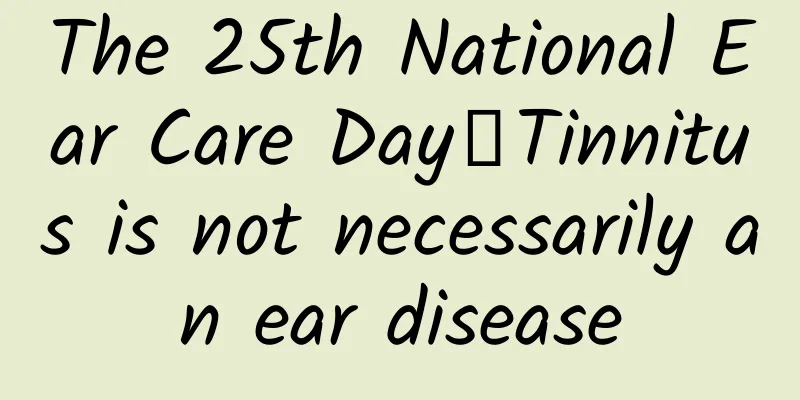The 25th National Ear Care Day丨Tinnitus is not necessarily an ear disease

|
Many patients often complain of tinnitus when they visit a doctor. Most patients believe that tinnitus is a problem with the ears, but in fact, there are hundreds of causes of tinnitus, far more than the causes of deafness. Tinnitus is a signal alarm. In a sense, many tinnitus is a well-intentioned "discipline inspection system" in the body, which often reminds patients not to violate the rules, pay attention to their daily routine, drink less, and get a good rest. Tinnitus is not caused by the ear 01Migraine Migraine is considered a primary brain dysfunction disease. Certain visual, motor and sensory symptoms have been listed as migraine aura symptoms. In the study of cochlear symptoms of migraine, it was found that the incidence of tinnitus is much higher than that of hearing loss. The incidence of tinnitus is particularly high among migraine patients with vertigo. Tinnitus research shows that 27% of tinnitus patients complain of headache symptoms, and the side of headache and tinnitus are significantly correlated. 54.9% of headaches occur before tinnitus, 34.7% of tinnitus occur before headaches, and 10.4% of both occur simultaneously. Epidemiology shows that migraine is a high-risk factor for tinnitus. A big data study in Taiwan shows that the incidence of tinnitus in migraine patients is 3.3 times higher than that in the control group. When a migraine attacks, it may damage the auditory system and initiate acute tinnitus. The sensitized migraine center will produce excessively distorted tinnitus signals during central compensation, which are more easily perceived. Acute tinnitus associated with migraine may account for an important proportion of acute tinnitus. Migraine repeatedly affects the inner ear and central functions, and the repeated process of acute tinnitus is one of the important reasons for the chronicity of tinnitus. 02Gastroesophageal reflux Gastroesophageal reflux is usually considered to be the reflux of acidic liquid from the stomach and esophagus into the throat. However, in clinical practice, it is not necessarily gastric acid liquid, but some acidic gases that rise from the stomach through the throat to the nasopharynx, stimulate the pharyngeal recesses and the pharyngeal opening of the Eustachian tube, and then pass through the channel between the nasopharynx and the middle ear tympanic cavity, namely the Eustachian tube, affecting the mucosal function of the nasopharynx and the middle ear, thus causing tinnitus. 03Vascular tinnitus Vascular diseases of the carotid or vertebral artery system, including intracranial and extracranial vascular diseases, can cause tinnitus. For example, arteriovenous fistulas and aneurysms often produce pulsatile murmurs that are synchronized with the pulse. 04Nasal diseases Allergic rhinitis, sinusitis, nasal polyps, benign or malignant tumors of the nasopharynx (nasopharyngeal angiofibroma, nasopharyngeal carcinoma, lymphoma, etc.). The main symptoms of the nose are nasal congestion, runny nose, smell changes, headaches. Since the nasal cavity and the middle ear are connected by the Eustachian tube, nasal and nasopharyngeal lesions can cause tinnitus. 05 Neuropsychiatric diseases In the process of auditory compensation, both the classical pathway and the non-classical pathway involved can have important connections with the amygdala. The connection between the classical pathway and the emotional system is the high pathway. The non-classical system and the emotional system are the low pathway. Sound plays an important warning role in survival, and non-dangerous sounds are quickly adapted by the auditory system. The low pathway of normal people is inactive, and the low pathway of tinnitus patients is related to the emotional system. Once the low pathway is activated, the emotional system will trigger an overreaction. The more severe the tinnitus, the heavier the emotion, and anxiety, depression, tension, despair and other psychological states will appear. The more anxious and depressed the tinnitus patients are, the more severe the tinnitus will be, and they will fall into a vicious circle. 06Obstructive Sleep Apnea Syndrome (OSA) The patient snores and holds his breath. If sleep disorder OSA develops to a severe stage, intermittent hypoxia may occur, thus affecting the blood supply to the inner ear. Some patients may experience tinnitus, hearing loss, or ear-related vertigo. 07Temporomandibular joint disorder syndrome It is the name of a group of related diseases and one of the common joint diseases in stomatology. The clinical manifestations are local joint soreness and pain, joint clicking and mandibular movement disorder. Sometimes patients may experience dizziness and tinnitus, which may be caused by mandibular joint dislocation, displacement of various parts of the joint during movement, and abnormal collision. 08 Systemic diseases (1) Metabolic diseases: Endocrine disorders (thyroid, pancreas, pituitary gland, etc.) affect the circulation of lymphatic fluid inside and outside the cochlea and the changes in ion concentration, causing tinnitus. Patients with hypothyroidism may cause hydrops in the membranous labyrinth, resulting in low-pitched tinnitus. Endocrine disorders can also cause tinnitus in postmenopausal women. (2) Vascular diseases: hypertension, hypotension, arteriosclerosis, hyperlipidemia, small vessel complications of diabetes; anemia, microthrombosis; cervical spondylosis, etc., which cause blood supply obstruction to the auditory system and cause tinnitus. (3) Autoimmune diseases: Immune-mediated inner ear damage may occur, causing the patient to experience unilateral or bilateral tinnitus, sensorineural hearing loss, vertigo, and aural fullness. Tinnitus is not only an ear disease, but also a warning sign for systemic diseases. I hope we take this warning seriously, adjust our lifestyle in a timely manner, and go to a regular hospital for medical treatment as soon as possible. SPRING FESTIVAL Author: Li Xin, Standing Committee Member of the Hearing Rehabilitation Committee of the Chinese Rehabilitation Medicine Association, Chief Physician of the Otolaryngology Department of Beijing Tsinghua Chang Gung Hospital Chief Judge: Lu Wei, Chairman of the Hearing Rehabilitation Committee of the Chinese Rehabilitation Medicine Association, Director of the Otolaryngology Department of the First Affiliated Hospital of Zhengzhou University |
<<: Either be thin or die? Who is selling body anxiety?
>>: Crohn's disease: Know it, detect it early and treat it early
Recommend
How to check the first use date of Xiaomi mobile phone? What to do if Xiaomi mobile phone is soaked in water and cannot be turned on?
Recently, I heard from a friend about his experie...
What causes joint cracking after childbirth?
Pregnant women need some time to recover after gi...
What should I pay attention to after the ring is removed?
If you experience fever, abdominal pain, excessiv...
What to do if a girl has a fake stomach ache
Menstruation is basically a normal physiological ...
What are the early symptoms of HPV
HPV is very common in women, and infection with t...
The story of the stethoscope
Your browser does not support the audio tag After...
Is it good to frequently cast nets in lobster ponds? When is the best time to cast nets?
Crayfish farming is also a type of aquaculture th...
What should you pay attention to when using facial mask during confinement?
Most young women have the habit of applying facia...
What to do if you have a severe cold during breastfeeding
Colds are a very common disease in life, and we a...
What to do if your hair is fine, soft and frizzy
The fashion industry believes that hair largely d...
Does fluid accumulation in the fallopian tube affect IVF implantation?
In modern society, more and more couples choose t...
Is eating oranges good for the fetus during pregnancy?
In the early stages of pregnancy, some pregnant w...
What to do when you reach menopause at age 30?
Female friends should first know that menopause b...
Can essential oils be used for private parts care?
Women's love of beauty is much stronger than ...









